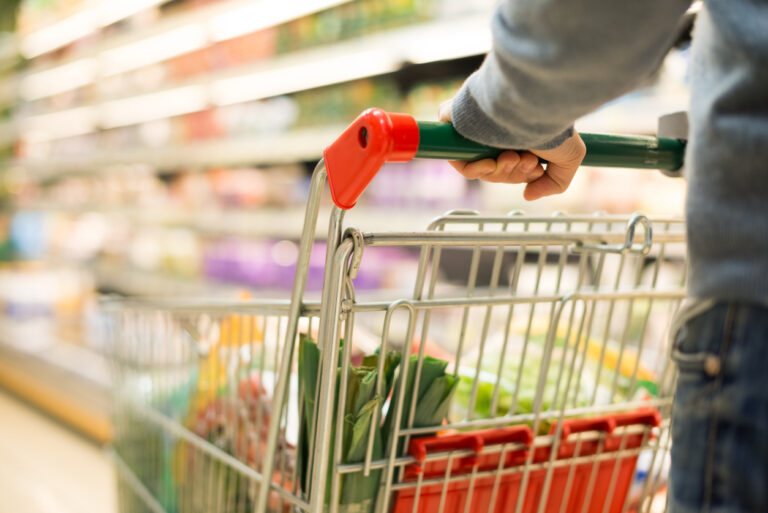Bermuda is used to hurricanes, and many of us tend to put off worrying about them until at least August and, even then, we are unlikely to stock up on supplies unless one is actually on the horizon, literally.
How can we afford to do this? Because we are confident our grocery stores will have all the essentials we need in the run up to a storm’s arrival.
Vernon Hassel has worked at the Marketplace full time for 22 years and for 12 years part-time prior to that. He is vice-president of purchasing. He told us when the grocery chain first starts preparing for hurricane season, what Bermuda’s favourite hurricane supplies are, and how they keep their stores supplied, safe, secure and able to reopen as soon as the roads are clear.
“We start preparing in April,” he began. “That’s with getting hurricane supplies, batteries, flashlights, putting those orders in so that they’re here by end of May, beginning of June.”
Water and ice are also kept in large supply: “We increase our supply of water. We have container orders that will come in that we leave at our central warehouse. The number one selling water is the Kirkland 40 pack, so we bring in extra of that. Just to be ready.
“We do the same thing with ice. My first experience working for The Marketplace, I was shocked at the volume of ice that we sell. I think people use it so they can put ice in the fridge for when the fridge goes out. It helps maintain the temperature.”
Another pre-hurricane purchase that surprised him was the volume of fresh meat customers bought: “For the longest while we couldn’t understand, then we started tracking and saw that BBQ and charcoal sales went up as well and we were like: ‘okay, individuals are planning on barbequing.”
Less perishable foods that are also popular include Vienna sausages, canned tuna fish and bread. “We have a back stock of those on a constant basis,” he said.
In terms of what flies off the shelves when we know a hurricane is coming, “water and batteries are the number one and number two categories, followed by a close third, alcoholic beverages and canned food,” he explained, crediting the ability of the local liquor wholesalers to ensure their shelves are well stocked in that department, even in the 48 hours before the storm arrives.
“Black Seal rum is still Bermuda’s number one selling rum, but vodka’s becoming popular, tequila is becoming popular, beer is always there,” he smiled, adding that while they see an increase in customers buying general supplies in the 48 hours prior to a storm, the atmosphere is “extremely calm”.
Maintaining the supply lines and then re-establishing them again after a storm has passed is no mean feat, especially when so much has to be imported. How do they manage this?
“We have a very vibrant supply chain both locally and overseas,” answered Mr Hassel. “We have partnerships with our local wholesalers, with our emergency water orders and supply orders, and once we have a better idea as to how close everything’s going to be, we say: ‘activate’, And then the deliveries get picked and delivered to our stores.
“When it comes to the shipping lanes, if the hurricane is coming, the ships will stay in New Jersey and wait for it to pass. It could cause a delay of up to three, maximum four days. We’re fortunate that we have two ships that come to Bermuda and bring fresh produce and meat. They come twice a week. Within the week they will land and we will be restocked with those products.”
In addition to keeping their customers supplied with everything they need for the storm, and until stores can reopen again, Marketplace staff need to get home, the buildings need to be secured and the generators need to be working. Some stores have generators that switch on automatically when the power goes out and some that need to be turned on manually. Again, this is a process they are well prepared for.
“We are constantly monitoring and maintaining our generators. They’re run every other week during non-hurricane time and weekly during hurricane season so we know they are operational. And, we have back-up generators. A few spares that are mobile in case one goes down.” The Marketplace is also investigating the feasibility of solar panels and battery storage.
While the Marketplace will stay open as long as is possible, “our most important assets are our team members and making sure that everything’s good with them,” said Mr Hassel. To this end, they follow Emergency Measures Organisation (EMO) guidance and make sure the stores close in time for everyone to get home safely.
Two staff members remain in each building to ensure that everything is fine during the storm and, if they need to, turn on the generators once it is safe to do so. Once the storm has passed, management are in touch with each other about safely reopening the stores, which they try to do as soon the roads are clear.
Once stores do open, staff are asked to go to their closest store, even if it’s not the one they are usually assigned to. This is because road blockages may mean they are unable to get to that store. “It’s more about helping customers that might be in need,” he explained. They have even been known to allow customers to keep certain medications in Marketplace fridges until their own power returns.
To help their customers be as prepared as they are, the Marketplace publishes a hurricane check list each year, listing all the things people should consider buying prior to a hurricane. What’s on Mr Hassel’s checklist? “Usually, chips, snacks and a bottle of red wine and I’m good,” he laughed.

